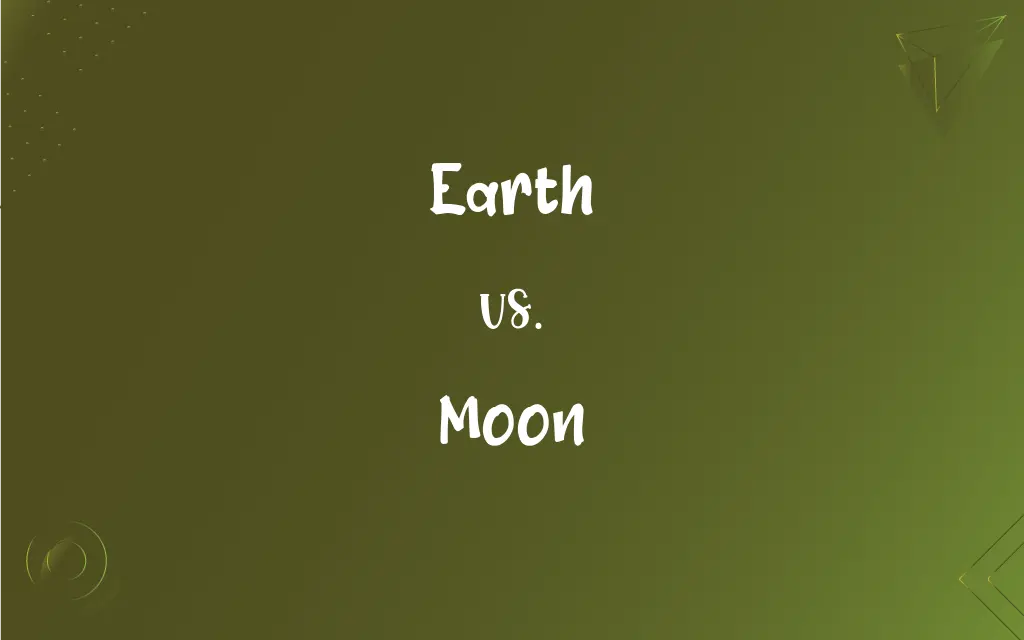Earth vs. Moon: What's the Difference?
Edited by Aimie Carlson || By Janet White || Published on February 9, 2024
Earth is our planet, rich in life and water, third from the Sun. Moon is earth's natural satellite, airless and waterless, orbits the Earth.

Key Differences
The Earth is a planet in the Solar System, third from the Sun, characterized by its abundant water and life-supporting atmosphere. In contrast, the Moon is Earth's only natural satellite, lacking an atmosphere and significant water, and is known for its cratered and rocky landscape.
Earth has a diverse ecosystem supporting various life forms, from microscopic organisms to complex human societies. The Moon, on the other hand, is barren and lifeless, with a surface marked by dust and rocky debris from meteor impacts.
The Earth's atmosphere is composed of nitrogen, oxygen, and other gases, playing a crucial role in climate and weather patterns. The Moon, devoid of a significant atmosphere, experiences extreme temperature variations and lacks weather.
Earth's rotation on its axis results in a day-night cycle and influences climate zones. The Moon's rotation and orbit around the Earth lead to phases of the Moon as seen from Earth, including new moon, crescent, and full moon stages.
Oceans and seas cover about 71% of Earth's surface, contributing to a stable climate and weather system. The Moon has no liquid water, with its surface being a mixture of mountains, plains, and craters, exhibiting a stark and desolate landscape.
ADVERTISEMENT
Comparison Chart
Physical Nature
Planet, third from the Sun
Earth's natural satellite
Life
Supports diverse life forms
Barren and lifeless
Atmosphere
Nitrogen, oxygen, and others
No significant atmosphere
Surface
71% covered by water
Rocky, cratered surface
Temperature
Moderate and varied
Extreme fluctuations
ADVERTISEMENT
Earth and Moon Definitions
Earth
The only known planet to support complex life.
Exploration of other planets helps us appreciate the uniqueness of Earth.
Moon
A celestial body with a rocky, cratered surface.
Astronauts collected rock samples from the Moon's surface.
Earth
The third planet from the Sun in our Solar System.
From space, the Earth appears as a blue marble due to its water content.
Moon
An object of fascination and exploration.
The Moon landing in 1969 was a monumental moment in space exploration.
Earth
Our home planet, teeming with life.
The Earth's diverse ecosystems are unique in the Solar System.
Moon
Earth's natural satellite, orbiting it every month.
The Moon's gravitational pull affects Earth's tides.
Earth
A planet with a suitable atmosphere for life.
Earth's atmosphere protects us and sustains life.
Moon
Visible from Earth,known for its phases.
During a full moon, the entire face of the Moon is illuminated.
Earth
Covered mostly by water, supporting various climates.
The Earth's oceans play a vital role in climate regulation.
Moon
Lacks an atmosphere, leading to temperature extremes.
The Moon's surface can reach scorching temperatures during the day and freezing at night.
Earth
The land surface of the world.
Earth
The softer, friable part of land; soil, especially productive soil.
FAQs
What causes the phases of the Moon?
The phases of the Moon are caused by its orbit around Earth and the changing angles of sunlight it receives.
What is the Moon?
The Moon is Earth's only natural satellite, known for its cratered surface and lack of atmosphere.
How far is the Moon from Earth?
The Moon is about 384,400 km (238,855 miles) from Earth.
Does the Moon have any water?
The Moon has traces of water ice, particularly at its poles, but no liquid water.
What is Earth?
Earth is our home planet, known for its life-supporting conditions and water coverage.
Is the Moon visible every night from Earth?
The Moon is not always visible at night due to its phases and position in orbit.
Does the Moon rotate?
Yes, the Moon rotates on its axis, completing a rotation approximately every 27 days.
Can you breathe on the Moon?
No, the Moon has no atmosphere to support breathing.
How does gravity on the Moon compare to Earth?
The Moon's gravity is about 1/6th that of Earth's.
How does Earth's atmosphere differ from the Moon's?
Earth's atmosphere is rich in nitrogen and oxygen, while the Moon has a very thin and negligible atmosphere.
What is the temperature range on the Moon?
The Moon experiences extreme temperatures, ranging from about -173°C (-280°F) at night to 127°C (260°F) during the day.
What causes tides on Earth?
Tides on Earth are primarily caused by the gravitational pull of the Moon.
Has the Moon always been Earth's satellite?
Yes, the Moon has been Earth's satellite since its formation, likely over 4 billion years ago.
Can we see the Moon during the day?
Yes, the Moon can often be seen in the daytime sky, depending on its phase and position.
How many people have walked on the Moon?
As of my last update, twelve astronauts have walked on the Moon, all during NASA's Apollo missions.
Can the Moon support life?
The Moon cannot support life as we know it due to its lack of water, atmosphere, and extreme conditions.
Why does the same side of the Moon always face Earth?
This is due to the Moon's synchronous rotation, where its orbital and rotational periods are the same.
How long does it take to get to the Moon?
Space missions to the Moon typically take about 3 days.
Are there earthquakes on the Moon?
The Moon experiences "moonquakes," but they are different in nature and less intense than earthquakes on Earth.
Is the Moon getting closer to or farther from Earth?
The Moon is slowly drifting away from Earth, at a rate of about 3.8 centimeters per year.
About Author
Written by
Janet WhiteJanet White has been an esteemed writer and blogger for Difference Wiki. Holding a Master's degree in Science and Medical Journalism from the prestigious Boston University, she has consistently demonstrated her expertise and passion for her field. When she's not immersed in her work, Janet relishes her time exercising, delving into a good book, and cherishing moments with friends and family.
Edited by
Aimie CarlsonAimie Carlson, holding a master's degree in English literature, is a fervent English language enthusiast. She lends her writing talents to Difference Wiki, a prominent website that specializes in comparisons, offering readers insightful analyses that both captivate and inform.































































